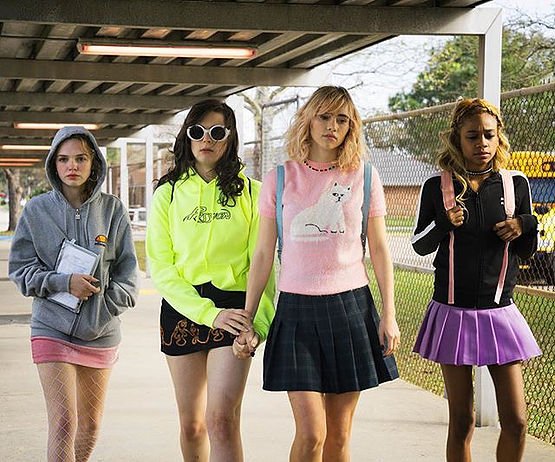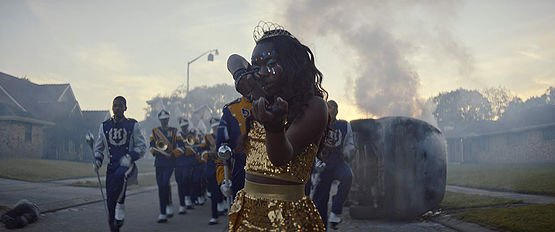Assassination Nation is Sam Levinson’s modern-day take on the Salem Witch Trials, and a “movie for absolutely right now” that you won’t be able to forget.
“This is the story of how my town, Salem, lost its motherfucking mind.” When high school senior Lily (Odessa Young) addresses the audience to introduce Sam Levinson’s modern-day take on the Salem witch trials, she promises a “100% true story”. As her words resonate in our minds, a trigger warning appears in the form of a perfectly timed montage with dreamy music and bold capital letters, letting us know from the very beginning that we are about to see “bullying, classism, death, drinking, drug use, sexual content, toxic masculinity, homophobia, transphobia, guns, nationalism, racism, kidnapping, the male gaze, sexism, swearing, torture, violence, gore, weapons and fragile male egos”. In the audience, some people smile. Others exchange puzzled looks and prepare for the worst. A few viewers get up and leave. We are intrigued.
Levinson (son of Academy Award-winning director Barry Levinson) describes his film as a “movie for absolutely right now“. His witch trials take place at a high school, in a digital world of selfies, hashtags and social networks, and his story revolves around 18-year-old Lily – our captivating narrator – and her best friends Bex (Hari Nef), Em (Abra) and Sarah (Suki Waterhouse) as they deal with a data hack that affects the whole town. The film starts off as a Heathers-style teen comedy, with a glimpse of the girls’ high school drama and daily routine, but soon develops into something else entirely when the school principal (Principal Turrell, played by Colman Domingo)’s mobile phone gets hacked, his private photos and data are exposed and the whole town slowly gets turned upside down when everyone’s secrets are eventually made public.
The first thing you’ll notice about Assassination Nation is how quintessentially high school it is. There’s dancing, there’s glitter, there are cheerleaders and colourful clothes that act as a constant reminder of just how current this story is. And if the girls’ appearence and behaviour help set the time of Levinson’s witch trials, there are just as many American flags and references scattered throughout the film that not only make it impossible for us to forget where the action is taking place, but also add a not-so-subtle social commentary that is very much present in most of the scenes.

But what makes Levinson’s message even more effective is the way it is delivered to us. Assassination Nation is a feast for our technology-addicted eyes and ears. From the sounds of whatsapp and iMessage texts, tweets, pings and selfie clicks to the shaky videos that appear in split-screens with added text, hashtags and emoticons, everything we see is all too familiar. When Lily addresses us with her words of wisdom on what being a teenager is like, we feel an instant connection with her. We can’t help but sympathise with her as we find out about her issues with her boyfriend (Mark, played by Bill Skarsgård), and we worry for her when we read her text message exchanges with an older man (her neighbour Nick, played by Joel McHale), saved as “Daddy” on her phone.
Then we meet the other girls, we smile when Bex philosophises about the girls being “all characters on the Sims and no one knows”, although we can’t believe she would describe herself as an “influencer” because a 42 year old man “buys her shit” from her Amazon wishlist. It only takes a few more minutes for us to familiarise with everyone’s lives and secrets, and, even before the real action takes place, we suddenly realise we are completely hooked.
Levinson explores more than one issue affecting modern America in his film, but his way of exposing our society’s dangerous addiction to technology is the most clever device, as he draws us into his world and, in a way, makes us addicted to it too. Assassination Nation doesn’t only deliver every single disturbing scene the trigger warning had promised – sex, violence, graphic and gory scenes… you name it – but it makes us part of the action. Lily’s monologues make it clear from the very beginning that she is absolutely aware we’re watching: the more she addresses us directly and shares personal information with us, the more we feel a connection with her. But it’s even more interactive than that: every little detail has been carefully planned to draw us in.
When Bex randomly shouts “I love this song”, we can’t hear any music and are just as confused as her friends are, but then she snaps her fingers, a song starts to play and we can’t help but smile. Levinson breaks the fourth wall by carefully scattering these moments throughout his film, winking at us through his characters: the film becomes our very own “social network” that the director created especially for us. The characters know we’re watching and are willing to share their life with us, making us part of the action and, at the same time, giving us a role as yet another technology-addicted judge in the story. As Lily herself puts it in one of her most poignant monologues, “the whole world is always watching and waiting, and it’s only a matter of time before you fuck it all up”.

When the data hack is revealed and the “trials” begin, we start to appreciate the real irony of this film. We are prepared for the worst, but things do not happen the way we would expect them to. As we witness an exaggerated amount of violence, torture, swearing and all sorts of misogynistic behaviour, we also realise that we didn’t need a trigger warning at all. Yes, the gore is there, and so is some pretty terrible human behaviour, but everything is filtered through mobile screens and digital devices, which gives us that detachment typical of technology, so much that the most violent scenes of the film are actually not shocking at all.
But the unexpectedly detached way violence is shown is not the only surprise that Levinson has in store for us. What’s even more important is that the scenes that actually get to us are those rare moments in which no technology is used, and we get to know the real people behind the “hashtag-masks”. When Principal Turrell – perhaps the only positive, stable figure in the film – tells Lily off for presenting an extremely graphic drawing for an assignment in which she was supposed to be “drawing from life”, Lily wins the argument by calmly replying that, although it may be explicit or extreme, “it sure as hell looks like life” to her. It’s moments like this that get our attention, as we realise that these girls are not portrayed as stereotypical teenagers rebelling against authority figures: they are opinionated, bold, fully able to defend themselves, and they definitely have something to say.
These teenagers are more mature than the actual grown-ups, and are doing their best to survive in a society that doesn’t seem to have room for them. Lily has always been a victim, even before an angry mob decides to target her as the “source of all evil” in Salem, and so are her friends. These girls voice their opinions but their parents don’t listen, so they leave family dinner and suffer in silence. They seek relationships to feel less neglected, but they are only able to build dysfunctional, toxic bonds with yet more abusive people who do not care about them. They wear a metaphorical mask to hide their pain, and they only take it off when nobody else can see them. “I’m not a bad person, Bex”, whispers Lily under her blanket, looking straight into the camera and breaking our hearts, in one of the most powerful, touching scenes of the film, before all hell breaks loose.
The darkest and most horrific moments of Levinson’s ironic drama are those that show us exactly what the citizens of Salem are capable of, and what makes these scenes even scarier is that we can recognise the dynamics that lead to the whole town going crazy. Because these people are not part of a community: this is a crowd of harsh, fundamentally ignorant judges, who are ready to point fingers but lack the most basic social skills.
This mob does not hesitate to assign guilt without knowing the facts, and does not even think of the consequences. After all, it’s a town in which a father can’t take a picture of his own son in the bathtub without being called a pedophile, but it’s ok for a married man to fantasise on teenage girls, or for a guy to try to choke his girlfriend because he’s seen it in a porn film. What started as a commentary on the role of technology in our lives becomes a much deeper critique of the most dangerous dynamics in our society, and this is when Assassination Nation truly becomes the “movie for absolutely right now” that Levinson had promised us.

When the girls decide to take ownership of their own fates, we are ready to side with them as they stop being princesses in pink wedges and effortlessly become the badass heroines this movie needed. Levinson’s references vary from Carrie (1976) and Halloween (1978) to Japanese girl-gang revenge movies and Kill Bill (2003), and we can even catch a glimpse of Harley Quinn’s baseball bat: Lily and her friends are given the permission to be angry, and the result is pure cinematic delight. There’s laughter, there’s blood and there’s utter madness. There are action-packed sequences and intense conversations, with a clever twist that seems to mock us all and gives the whole film a new, much bleaker meaning.
Assassination Nation is the ultimate girl power movie, with fully believable characters who rebel against a broken society and use every single means at their disposal. It’s a call – or, rather, a tweet – to action against violence, misogyny and addiction in an America that has lost its values. It’s a film for the #MeToo generation that urges us to stand up for one another, and a visually stunning horror film that uses irony to draw us in, and makes us laugh and cheer out loud only to leave us speechless when its message comes across. Because, just as Lily’s voiceover eerily reminds us, “This is your world. You built this. Don’t take your hate out on me, I just got here. You may kill me, but you can’t kill us all.”
Assassination Nation premiered at the London Film Festival on Oct 19, 2018.

